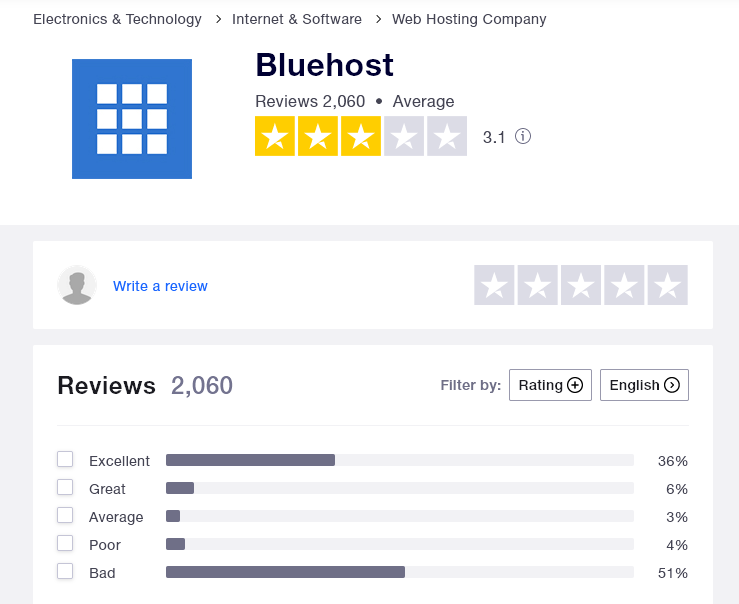Starting a New Blog? Read this First!

So you want to start a new blog? Are you starting a new blog already? Have you started a new blog recently?
In case you said “yes” at least once this article is for you.
You will save lots of
- blood
- sweat
- tears
thanks to my experience of starting several blogs over the years.
Yes, I have started lots of blogs by now and some have succeeded.
Other blogs haven’t. I can already spot patterns and issues. Read on to find out about it!
Just Another “How to Start a Blog” Affiliate-Scheme? Nope!
First off a word of caution. There are lots of “how to start a blog” guides out there. Their purpose is mainly to make money off affiliate commissions.
They will take you through the very basics of setting up WordPress and most importantly a hosting package they recommend, usually Bluehost.
Why do most guides recommend Bluehost? Bluehost is paying the highest affiliate commissions. It’s up to $130 per sale.
By pushing Bluehost you can make literally millions with such step by step “tutorials”. I have worked for a site that made money that way so I know.
Those guides will usually not tell how the art of blogging really works and what to expect once you have set up the software and paid the hosting.
This is NOT another sneaky guide like this. It’s not just another affiliate-scheme like this. I’m too ethical to make money that way. This is the real deal. It’s about actual blogging and how it works or doesn’t.
On a side note: Bluehost is fine although many complain about their customer service. They have a whopping 51% of 1 star reviews on Trustpilot:

You can get a WordPress blog and hosting plan cheaper and better elsewhere though. Make sure to compare offers first.
Past Success with Blogs I Established
It’s not a secret that I’m not as active on SEO 2.0 (this blog here) as in the early days anymore.
I’ve turned out an “occasional blogger” over the years.
I was publishing work related articles mostly over at the many client blogs I’ve written for.
I have been hugely successful with an Oxford-based agency client blog. It became the number one and most popular UK SEO blog according to Google and the UK Search Awards of 2011.
That year 9 out of 10 of the most popular articles (measured by engagement) were written by me.
It also had an impressive following on different social media sites and other parts of the blogosphere. Thus
some of my posts got shared by hundreds of people.
bike-blog.info – A cycling blog in German I established for another client in 2008 originally – still or again runs strong and ranks on top of Google in 2022.
The SEO 2.0 blog is is a dark-horse by now and by far not as widely acclaimed as it was once was.
I get Google traffic again after optimizing existing content and even social media gets me some casual visitors. After all I established also some engaged audiences on social media like Twitter or Pinterest.
When it comes to Pinterest it’s not even just about publishing fresh content. bike-blog.info gets traffic from evergreen content as well.
How Long Does it Take to Create a Successful Blog?

Blogging is a marathon not a sprint. You have to show up again and again and ideally focus on your own project, ideally just one.
When you’re hugely successful like I was you will need a few months to get some traction.
Otherwise you need a year or years to get there. Most blogs do not succeed at all though!
By success I do not even mean money-wise yet. I mean traffic, engagement and vanity metrics like that.
Monetary success is the next level that needs the organic reach first as a prerequisite.
By organic reach I mean reach on your own site, not social media or through content you contribute elsewhere.
Even in case you succeed to get organic reach there is no guarantee there will be ongoing success.
How do I know? I made the mistake to become a successful blogger and get hired by someone else then.
I worked for many (other) blogs at once and was neglecting my own.
I was young and I needed the money so I have an excuse but that won’t pay the bills now that I’m old and need the money and other people run the successful blogs I started.
Another mistake was to create and try to maintain too many blogs at once. I still have four blogs I run part-time besides working for clients. You can imagine that none of them is really successful.
Spreading yourself too thin won’t work. Also life happens and you can’t always work nights and weekends when trying to make ends meet with a blog or two or three or more. So unless you make so much already that you can hire a team…
Blogging Success is NOT Enough
As a blogger I excelled. I wrote a lot and popularized that content with ease. I did not even have to self-promote. I could make people share my content by the sheer enthusiasm I exuded.
As long as I had the energy and motivation that worked. The times are changing though. You are also changing and aging!
At first things looked good. For many years people hired me to blog for them. It was a relatively stable and regular income.
The actual blogging jobs did not make enough money though so I had to do more “real work” apart of it.
I undervalued my writing and other services on top of that. Thus I did not earn enough money to sustain blogging for myself.
Blogging by itself is not a business model unless you are hugely popular and by that I mean millions of visitors or a very sales oriented affiliate marketing set up. Blogging is a fantastic means to get
- steady traffic
- engagement
- inbound links
Yet as long as you don’t sell something with it or on top of it you still won’t make enough money by the actual blogging.
Thus make sure to come up with a viable business model before you start blogging. What do you want to sell down the road? Check out exactly whether it can work. Ask yourself questions like:
- Who will be your audience and where will you attract it?
- Is there a lot of competition already?
- Are the affiliate commissions etc. paying enough?
For my bike blog I had all the above answered but failed to monetize it through affiliate marketing anyway. People just did not buy bikes immediately after clicking on my links. They were still looking around and not yet ready to buy.
Success Can Become Routine
As long as your blog is successful everything is alright? Well, it bored me a little. Thus I joined a completely new client blog over at a promising software startup from Eastern Europe.
Their blog was almost completely empty when I started to write for it. I had to build it up from scratch and it worked.
We parted ways long ago. My content still ranks well on his blog a decade later.
While blogging there and for the Oxford agency has become routine, both in a positive and negative sense on the startup blog I had to rediscover the art of blogging in a way. I had to
experiment and find a new unique writing style once again.
As this was actually my third flagship SEO blog I developed it was not as easy to become someone else for it. On the other hand I can’t just copy the blogging style I use on SEO 2.0.
I didn’t want to use the same types of posts, the same headline formulas. I don’t even like to repeat myself all the time.
Once success becomes routine you are already in a downward spiral though. Repeating the same type of formerly successful posts won’t work forever.
When there is no joy anymore consider selling the blog. Once the blog goes down the drain it will be too late for that!
Can you Repeat Success Over and Over?
Who else could start a new successful blog? After all I’m the guy who explained how to achieve blogging success in 2007 and has proven ever since that it works.
It’s bizarre. It’s the same person writing, the same topics (search, social media and blogging) and even the same Internet.
My readers vary though. Surprisingly very different people seemed to read the three blogs I wrote for about the same topics.
- SEO 2.0
- the UK agency blog
- the startup blog
even though all three of them serve the search industry audience and cover very similar tools and techniques.
At least they appeared to be different as other people shared the posts on social media for instance.
You could think that the audience follows the author, like with books.
On the Web the publishing house, here the blog, seems to be much more important though. People know a particular source to be trustworthy or interesting and they return to it again and again.
A new source has to prove it’s worth it, even if the writer is already known from elsewhere.
Many people do seem to ignore the author altogether though. Just the brand of the blog counts and gets memorized. This is especially true for multi-author blogs and corporate blogs.
Sometimes s the author’s name is not even mentioned. That’s ghostwriting then. For a blogger it’s like a disappearance.
Always ensure that your name is mentioned, ideally with a link or more.
Thus every time you start a new blog you start from scratch. You can’t simply move your existing audience to a new blog. It takes time and effort and you will never get the same people, online some of them.
Also consider the cautionary tale of Michael Arrington – the man who created and popularized the back then most well-known tech blog: TechCrunch. One day he was fired by new owners AOL from his own blog.
I know his pain. It happened a few times ever since to myself. You build up a new blog for someone else and once you*re done they don’t need you anymore and get rid of you.
After such a huge step back it’s hard to start again. You can’t repeat the blogging success of the early days over and over. It has worked for me for a few times but it’s not an automatic process that works every time!
Back to the Future
Before starting to blog over at my startup client I considered writing again for Hubspot – by then a hugely popular marketing blog. I did a few times in 2007 but then lost touch with them.
Writing for the same blog after a pause of several years felt a bit weird. I didn’t really know what to write about. Could I really use the same formula I used in the past in a different context?
That was strange because Hubspot’s inbound marketing is largely the same as my SEO 2.0 philosophy.
Such lack of inspiration doesn’t really happen with a new blog. I think I know why:
A new blog is like a new love. It’s full of insecurities but it’s also exciting.
A new blog exciting because not everything is routine and popular. You have to find out what works. You have to find your voice and audience. It’s trial and error and it’s fun!
I love it. Call me a serial blogger. I love blogging despite the hard work it takes to get just a few shares on social media. That’s the joy and pain of starting a new blog.

Yes you are true.
i am on the same situation of not blogging continuously.
You just need to rekindle the old flame. I mean may be you missed the interactivity that’s why tend to lay low.
A new blog is like a new year at school – everythings different (classroom, teachers, subjects, routine etc) but you’re still in the same buidlings and still being a student.
It’s just that because everything is a fresh start, it re-egernises and helps the flow of ideas as there isn’t the bagadge that always builds up along the course of any project.
@Alex:very well said.
The toughest part I feel about blogging is that the most of the stuff we write about is already there on the web so it keeps us thinking of new ideas.
I agree with Akash. It’s difficult to find topics that haven’t already been written about and discussed. I keep a notebook specifically for blog post ideas and I find that about 75% of those ideas have already been done. It can be disheartening but at least those 25% of ideas are useable.
it is hard to think new ideas and strategy to catch readers attention to blog. people doesn’t care to read specially if your blogs are quite long.
I’ve always been reserved and reluctant to start a blog because although I read a lot, it’s hard to find the time to share thoughts. I’ve recently started my own blog with limited success because I always feel that small posts are not enough. I always want to write a monster post that adds value but this involves a lot of time invested time and time again. Still search for my flow…
I agree, one of the hardest parts is generating new ideas to blog about, as blogs that are full of dull or repetitive information just don’t work, so may as well not be published. From a business point of view, it just shows the importance of keeping new product development flowing, gaining good customer testimonials, and having great suggestion ideas (e.g. recipe ideas for a food company).
I think it’s painful to start a new blog. If you can make it through the first 3 months then it is much easier.
@Anndria,
Most of us do not like reading very long blog posts but as long as the posts are able to provide very useful information they can hold on the visitors.
Mark Mars: What can I say, you have a great blog there. +1!
Lewis Warren: I checked out your blog and the topics you cover are all right. You may want to spice the posts up with some images and maybe declutter your design a bit. You’re just a few inches away from creating a high quality blog.
Franklin: That’s true. 3 months seems to be some kind of magic number when it comes to blogging.
Akash: Most people scan instead of reading. So a long blog post that is scannable is great for both casual visitors and those few who take the time to read the full posting.
That is a good point Ted. But what I feel is that, it should not matter how long the post is, what is important is to look for whatever the post is about, is it able to do justice with the subject. One could right a 500 word post, still being very informative and one could right a 2000 words post. And, yes I agree that the longer the post is, it will be able to cover more things than a short one.
yes i agree. really hard to think of new ideas on blogging that people will be interested reading it.
I feel you. I’ve been blogging for fun since 2007 but I think (I’m sure) it’s about time I do something more with it.
A blog with good loyal users can fairly easily convert into an affiliate site or even ecommerce selling related items and services. I’ve seen a number of guys and gals do that. Not all successfully, but several have been. Seems to be a good way of ‘doing something with it’ as Ardham Jeanne said.